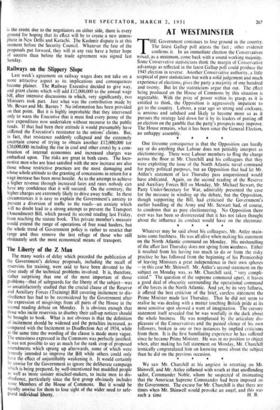The Liberty of the Z Man
The many weeks of delay which preceded the publication of the Government's defence proposals, including the recall of reservists for training, were said to have been devoted to the close study of the technical probleMs involved. It is, therefore, rather surprising that one of the most important of those problems—that of safeguards for the liberty of the subject—was so unsatisfactorily studied that the crucial clause of the Reserve and Auxiliary Forces (Training) Bill covering incitement to dis- obedience has had to be reconsidered by the Government after the expression of misgivings from all parts of the House in the second reading debate on Monday. It is obvious enough that those who incite reservists to disobey their call-up notices should be brought to book. What is not obvious is that the definition of incitement should be widened and the penalties increased, as compared with the Incitement to Disaffection Act of 1934, while at the same time the wording of the clause is made more vague. The uneasiness expressed in the Commons was perfectly justified. It was not possible to say as much for the rank crop of proposed amendments which sprang up afterwards, some of which were honestly intended to improve the Bill while others could only have the effect of unjustifiably weakening it. It would certainly be unwise for the Government to ignore the deliberate campaign which is being prepared, by well-intentioned but muddled people as well as more sinister mischief-makers, to incite men to dis- obedience, particularly since the first group obviously includes some Members of the House of Commons. But it would be equally unwise for them to lose sight of the wider need to safe- guard individual liberty.


































 Previous page
Previous page